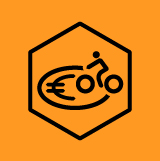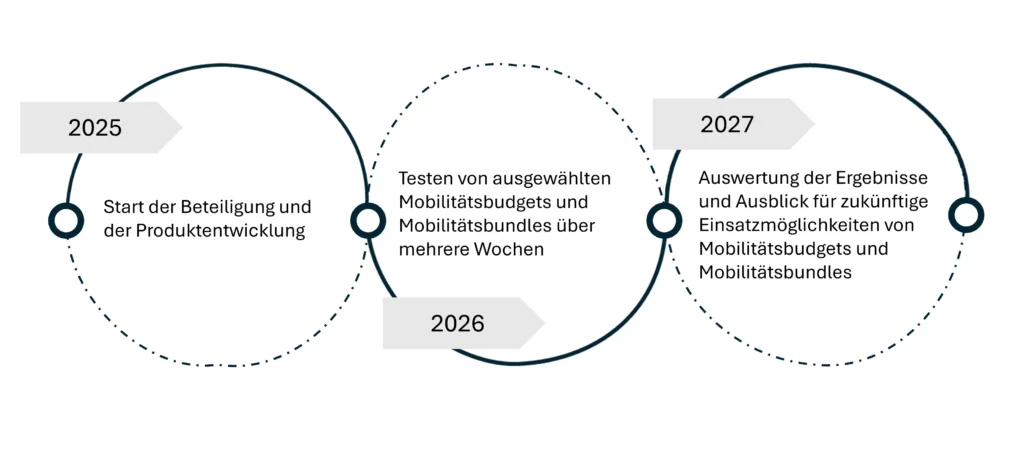What is MobiPionier?
Imagine: Being mobile on the move - simply flexible and environmentally friendly. Without being tied to a single mode of transport and suitable for every journey.

In MobiPionier, we want to increase the use of eco-mobility - such as buses and trains, sharing services and bicycles - and ensure that different modes of transportation can be flexibly combined.
The central question is: How can sustainable mobility services be designed in such a way that they really fit into people's everyday lives?
Mobility bundles
Different means of transportation, for example bus, train and e-scooter, are combined into a package at a fixed price.
Mobility budgets
A flexible amount of money that can be used for different means of transportation as desired - simply via app!
We analyze how existing apps and offers work and what people really need.
Together with the City of Munich, companies and citizens, we develop the best budget and bundle solutions.
The services are being tested in real-world laboratories for everyday mobility and for traveling to and from major events.
We measure how well Mobility budgets and Mobility bundles and what effects they have.

Sustainable mobility in the company
Testing mobility budgets and mobility bundles
Innovative mobility solutions for events
Further information
You will gain access to new, flexible mobility options that will make your everyday life more convenient and sustainable. And by taking part, you will help to develop solutions for the Munich metropolitan region.
The project is open to anyone who is curious about new forms of mobility and wants to help shape the future, commuters, students, families or senior citizens. Further information on project participation will follow shortly.
No, it's not about bans, but about new alternatives. You decide for yourself when to switch to bus, train, bike or sharing services. MobiPionier offers more freedom and less dependence on the car, without any compulsion.
MobiPionier is part of “MCube” - the “Munich Cluster for the Future of Mobility in Metropolitan Regions”.
The protection of participants' personal data is a top priority for us. All data collected is anonymized and used exclusively for research purposes. The data protection regulations are strictly adhered to
Experienced partners from science, administration, business and society work together in MobiPionier under the leadership of the Technical University of Munich.
The Chair of Mobility Policy at TUM researches political, regulatory and social aspects of urban mobility. We develop evidence-based recommendations for action for urban planning, transport policy and sustainable mobility strategies. The professorship combines scientific analysis with practical projects and supports decision-makers in administration, business and politics in the design of future-proof, digitally networked and sustainable transport systems.
At the Chair of Settlement Structure and Transport Planning at TUM, we research how cities or other forms of settlement and transport can be designed in such a way that all people can travel sustainably and reach their destinations with the shortest possible distances. We develop methods to find gaps in this accessibility and work together with society and practitioners to develop solutions for sustainable, liveable and equitable urban development.
The Mobility Department (MOR) is the central point of contact for all strategic issues relating to mobility and transportation in Munich. Our goal is equal and safe coexistence on our roads and a better quality of life in Munich.
Deutsche Bahn Connect is a subsidiary of Deutsche Bahn and develops and operates digital and sustainable mobility solutions such as car and bike sharing, for example Flinkster and Call a Bike. It also handles DB's fleet management, develops mobility budgets and networked transportation solutions for companies, cities and private customers. The aim is efficient, networked and environmentally friendly urban mobility.
Stadtwerke München supplies the Bavarian capital and the region with energy, drinking water, telecommunications and public transport. We contribute to a networked and sustainable urban infrastructure via the subway, bus and streetcar. We rely on renewable energies and digital solutions to shape sustainable cities.
The Munich Transport and Tariff Association (MVV) coordinates local public transport in Munich and the surrounding area. We integrate S-Bahn, U-Bahn, streetcar, bus and regional trains under a common fare and transport planning system. With standardized tickets and timetables, the MVV supports efficient, reliable and user-friendly mobility.
The ADAC Foundation promotes safe and sustainable mobility and is committed to accident prevention. It supports educational and research projects on road safety, mobility of the future and first aid measures. With practical programs, the foundation contributes to improving safety and mobility skills in Germany.






Are you interested in working with MCube?
Then please get in touch with us.
What is MOSAIQ?
Imagine something: There is more space for people. The streets have more trees and plants. Everyone can get around better. That's how your Schwabing-West district could be in the future. How would you like your district to be? We want to talk to you about it!
The project is called MOSAIQ. MOSAIQ is a research∙project. MOSAIQ means: Mobility and urban climate in the future city∙part. The Technical University of Munich is leading the project.
What is MOSAIQ about?
MOSAIQ wants to make the streets in the city∙part more beautiful. People should feel comfortable there. There should be more space. For meetings and plants, for example. You can help decide what is tried out in the Stadt∙teil. The ideas come from you. Some ideas will be tried out on the streets for a certain period of time.
The aim of MOSAIQ is to make urban districts good places to live.
At the same time, the climate in the city should improve. And people should be able to move around the city easily.
What is happening in the district?